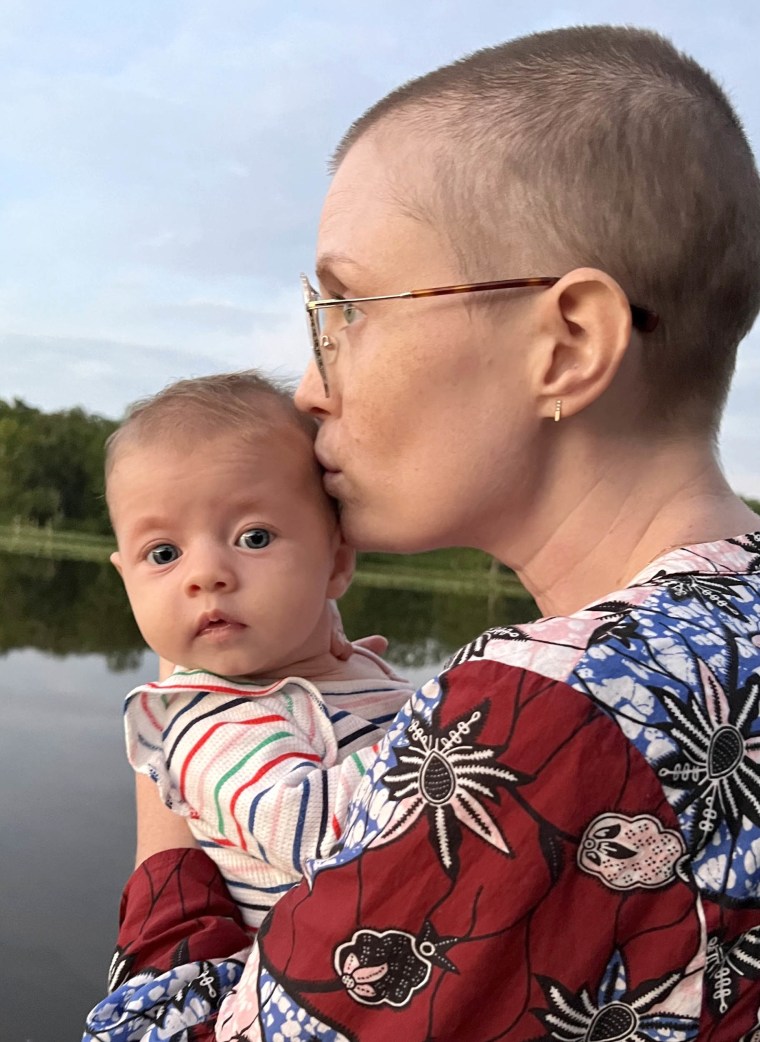Casey McIntyre wanted her friends and loved ones to hear about her death directly from her, and on her own terms, her husband says.
So on Tuesday, Nov. 14, that’s exactly how it happened.
“A note to my friends: if you’re reading this I have passed away. I’m so sorry, it’s horse (expletive) and we both know it. The cause was stage four ovarian cancer,” a message posted to McIntyre’s X account read.
“I loved each and every one of you with my whole heart and I promise you, I knew how deeply I was loved.”
McIntyre was 38. She leaves behind her husband, Andrew Rose Gregory, and their 18-month-old daughter, Grace. The family lives in New York City, where she worked as a book publisher.

The young mom’s death and candid message has received widespread attention on social media, as has her wish to erase other people’s medical debt through donations made to the charity RIP Medical Debt.
The nonprofit uses the donated money to buy and pay off medical bills owed by low-income Americans. More than $190,000 was raised for a campaign in McIntyre’s name by Saturday, Nov. 18, making it one of the most successful individual campaigns in the charity's history, RIP Medical Debt announced on its Instagram page.
“I am so lucky to have had access to the best medical care,” she wrote in her final message, “and am keenly aware that so many in our country don’t have access to good care.”

'She tried everything'
McIntyre was diagnosed with ovarian cancer in 2019 after complaining of swelling of her abdomen, her husband says. It turned out to be severe ascites, or the build-up of fluid in the space between the lining of the abdomen and the organs, according to the National Library of Medicine.
More than one-third of women with ovarian cancer develop ascites, the Ovarian Cancer Research Alliance notes.
McIntyre underwent chemotherapies, surgeries and some experimental immunotherapies.
“I will just assure you that she tried everything for me, her daughter and her family,” Gregory tells TODAY.com via email.
“She re-entered treatment in September 2021 after 18 months of no evidence of disease and was released into home hospice in June 2023. We were fortunate to have one last bonus summer together.”
McIntyre did not have BRCA gene mutations that can raise the risk of ovarian cancer, he adds.
The couple had planned the “medical debt jubilee” as part of her memorial when it seemed she was going to die in May. “I am happy we were able to postpone it six months,” Gregory notes.
Her memorial will now take place in December. He says that as his wife’s friends and loved ones mourn her, they can also take comfort in knowing they helped destroy medical debt for people in need thanks to her last wish.
“I am struggling to live my life without my wife who I purely adored, but Casey suffered so much in the last years and especially last weeks of her life,” Gregory says.
“Ovarian cancer is crueler than you can imagine. In her last days we were all able to tell her, ‘Casey, you have done it all. The race is swum. Find rest, find peace, be free.’”

Symptoms of ovarian cancer
Only about 20% of ovarian cancers are found early, according to the American Cancer Society, mainly because the symptoms can be vague.
The warning signs include:
- Bloating or belly swelling with weight loss
- Pelvic or abdominal pain
- Trouble eating or feeling full quickly
- Urinary symptoms such as always feeling like you have to go or having to go often
- Fatigue
- Upset stomach
- Back pain
- Pain during sex
- Constipation
- Period changes, such as heavier bleeding than normal or irregular bleeding
Besides inherited genetic mutations, risk factors include getting older, having obesity, having children for the first time after age 35 or never giving birth, taking hormone therapy after menopause; and having a family history of ovarian, breast or colorectal cancer.
There’s no routine screening for ovarian cancer and no early detection test.
The CA-125 blood test can detect high levels of certain tumor markers that are often found in women who have ovarian cancer, the National Library of Medicine notes.
But the test isn’t ordered during routine checkups for women because it’s very non-specific, Dr. Jason Wright, chief of gynecologic oncology at Columbia University in New York, previously told TODAY.com.
“Any type of inflammation, any type of infection, things like fibroids, endometriosis, all of those things can cause an elevation in CA-125 levels,” he noted.
Regular pelvic exams may help with detection because an OB-GYN can feel a mass on an ovary, but often the cancer has already spread by that point, Wright said. Another tool to find tumors is a transvaginal ultrasound.
Because the warning signs are “very vague,” women have to be their own advocates, Wright advised. If the symptoms persist, get worse or aren’t getting better with other treatments, women should raise the possibility of ovarian cancer with their doctor, he noted.

